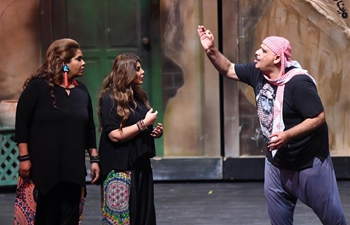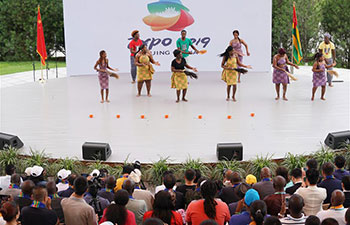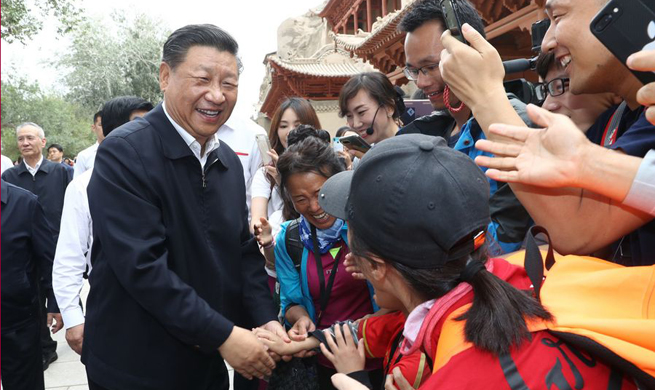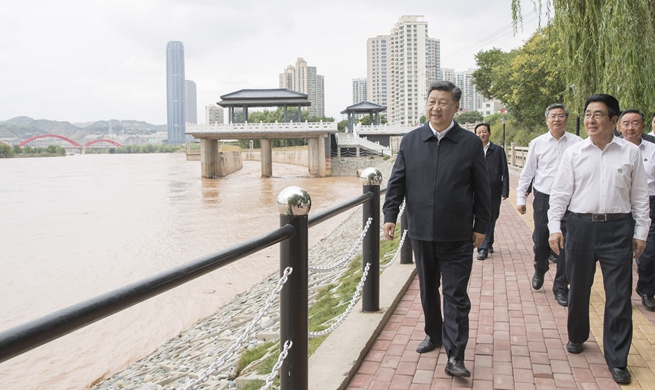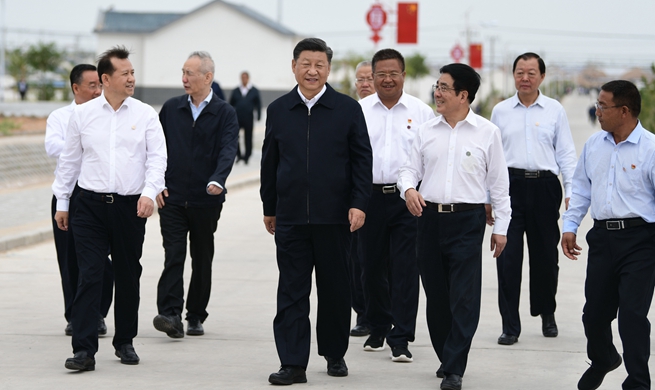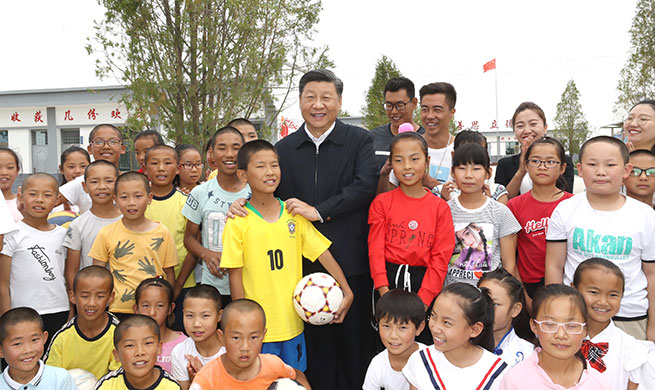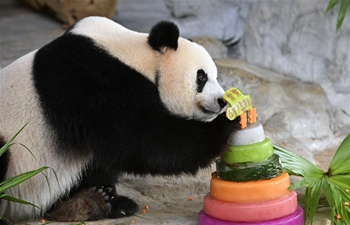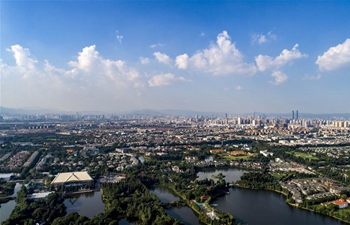by Xinhua Writers Bai Xu, Yue Dongxing
CANBERRA, Aug. 23 (Xinhua) -- Arts practitioner and patron Carrillo Gantner has a recipe for happiness: to act in a play once a year, direct a play once a year and go to China once a year.
"I don't direct and act much now, but still go to China," said the 74-year-old Gantner.
A report of The Sydney Morning Herald described him as "the great showmen of the Australian theatre." In fact, he has many titles.
A professional actor and director, he had been the Cultural Counsellor at the Australian Embassy to China in the 1980s, and an advisory board member of the Center for China in the World at Australian National University between 2011 and 2013. He received the Cultural Exchange Contribution Award for his outstanding contribution to China's cultural exchanges with the world, and was appointed to a Companion in the Order of Australia earlier this year.
But he would like to call himself a bear-hugger who was engaged in a life-long mission to improve China-Australia relationship, because in Australia those who support China were always called panda-huggers.
"Artists are very good ambassadors because they spoke common language of the heart," he said while speaking at the Conference on Dialogue of Asian Civilizations earlier this year as a representative from Australia.
"Cultural exchange allows us to see a better world," he added. "And I think cultural exchange allows us to see some of the best that each country has to offer...So cultural exchange let you understand the other and through understanding, you're more likely to exist peacefully together."
BOOSTING UNDERSTANDING
In his office in Melbourne, Gantner's love of Chinese culture could be seen everywhere, from the traditional painting scrolls to the portrait of a Qing Dynasty official, from the statue of a Buddha to a sculpture of a contemporary Chinese artist.
He told Xinhua that his interest in China really started when he was an undergraduate in the Melbourne University. "My mother had a very good friend, who was a Chinese scholar," he recalled. "She was often visiting my mother and talking about China, and she gave me a couple of her books to read about China."
As time passed, his interest grew. He joined in a group which included Steve Fitzgerald, who later became the first ambassador to China in the early 1970s.
"They started a body called the committee for new China policy, which was a committee to lobby the government to recognize the People's Republic of China. So I joined that," he said.
Gantner's first China visit was in February 1977.
"We were meant to go in October 1976, and the day before we would leave the trip was canceled," he said. "And 24 hours later, we learned that Mao Zedong was dead."
His first visit was just before the Reform and Opening up, and was later invited to bring an Australian theater group there.
"It took some time to organize that, to choose the delegation and make plans," he said. "But we went in 1978, I think it was in October 1978."
"We were a group of actors, directors and managers," he added. "In China every day we visited Chinese theater troupes, teaching schools like the Central Drama Academy or the national Peking Opera training school, or we saw performances of theater, opera, puppetry, music, symphony concerts, everything."
In retrospect, he remembered that people were dressed in army blues and greens and grays. "It was pretty drab," he said. "Everyone rode bicycles. So the sound of ringing bicycle bells as the noise you heard in the street."
They went to four or five cities, among which he especially remembered Shanghai well. "When you looked across from where the Peace Hotel is, from across the river, to what is Pudong now, it was a field. It was very, very new and the development you know, came afterwards."
Gantner also brought Chinese performers to Australia, with the first being a Fujian puppet company. "They were coming to an international puppet conference in Hobart, so I asked if we could present them at the Playbox Theater in Melbourne," he said. It was in 1979, and the week-long performances were sold out. "People loved them. They were remarkably skillful, they were charming people."
The event was so successful that Gantner invited the Nanjing Acrobatic Troupe the next year. "It was chosen because Victoria and Jiangsu recently signed the first sister state agreement between Australia and China," he said.
For Chinese people who rarely had overseas experiences, the visit was eye-opening.
They stayed in a hotel in Sydney. Party secretary of the troupe initially didn't want the performers to go out in the evening, "because King's Cross had a reputation of being the Red Light District with night clubs," Gantner said.
"I had to persuade them that they were perfectly safe. So when we came out of the hotel, we were together, so that no one could go off and be corrupted by the bourgeois liberalism," he said.
In Adelaide, they had a meeting to discuss if they should go to the disco, which the performers assumed as the "den of corruption." In the end the management of the company agreed and they went together. "When 50 of us walked through a disco, people dancing there didn't know what was going on."
The experience taught Gantner that China and the West didn't understand each other, and many perceptions were very wrong. "So it made the work we were doing in cultural exchange all the more important, so that people really understood how the two countries think and work and perform."
DAZZLING TRANSFORMATION
In 1984, he applied to go to China as the cultural counselor of the Australian Embassy. He went the next year to Beijing. "I had three years doing that, which were wonderful happy years of my life."
During that period, he directed plays, brought Chinese performers to Australia and introduced Australian troupes like the Australian Ballet to China. He negotiated for the introduction of two giant pandas to Australia. He visited China's rocket launching base in southwest China's Sichuan province.
He also met the woman named Ziyin, who later became his wife.
This year marks the 70th anniversary of the founding of the People's Republic of China, while last year China celebrated the 40th birthday of Reform and Opening up.
"In my lifetime, going to China now for almost 50 years, the transformation is just dazzling," he said. "From a very poor and isolated -- and in rural areas very backward -- country to a country that is now aspiring to be a middle-income country with enormous prosperity. Hundreds of millions of people have been raised out of poverty with extraordinary infrastructure."
By the end of 2018, China's high-speed rail mileage exceeded 29,000 km, ranking the first in the world.
"Last year, I went from Beijing to Shenzhen on the fast strain. And then it took another two hours to go by car through the border in Hong Kong." He said that transportation in China is now much easier than it was decades ago. "In the old days, when we were traveling from Hong Kong, we went to the border on a little train, walk past a guard post with the British flag, cross the pedestrian bridge to a guard post near the Chinese flag. Then we went through, got on the Chinese train and it took several hours to get to Guangzhou."
"Now the train goes right into the center of Kowloon. So I hope next year to do that trip on the train," he said.
He also saw the changes in people's cultural life.
In the past, Gantner noted that the performance tickets were given to the companies or institutions, then known as Danwei, where they would be distributed to individuals.
"The tickets were all given out, but often people couldn't be bother coming," he said. "So sometimes there were a lot of empty seats."
Everything is now done on the internet. "When Meng Jinghui's production 'two dogs' came to the Melbourne festival several years ago, they put the production on their Wechat," he said. "So within two days the show of two seasons were sold out. So when we went to the performance it was wonderful."
Gantner also noticed that many audiences in the theaters were young people. "The young seemed to love the theater," he said. "In the West, in Australia, the audiences tend to be older audiences."
In Australia there are over 200,000 Chinese students. "There is much greater appreciation and understanding across the societies," he said. "I think there is respect for China's growth in the world for its rising economic status."
Gantner said he loved being in China. His mother-in-law, famous Chinese actress Fang Jufen who was President of the China National Theater for Children, is now 89 and he visited China several times a year.
"I have Chinese family now through my wife," he said. "I've always said that for whatever little bit I have done I always receive so much more kindness, hospitality, and appreciation from another culture that vastly enriched my life."
In a speech he delivered in the Australia-China Institute for Arts and Culture titled "hugging bears," Gantner said "I am planning to come back in 100 or 150 years...Australia will sit loosely within the Chinese orbit of influence but curiously it will not feel all that different to the American orbit in which we now meekly circle. We will doff our hats to Beijing as we do today to Washington and as we did for the first 150 years of our European history to London."


